Sanctioned Chief Of Staff Accompanies Iranian President To New York
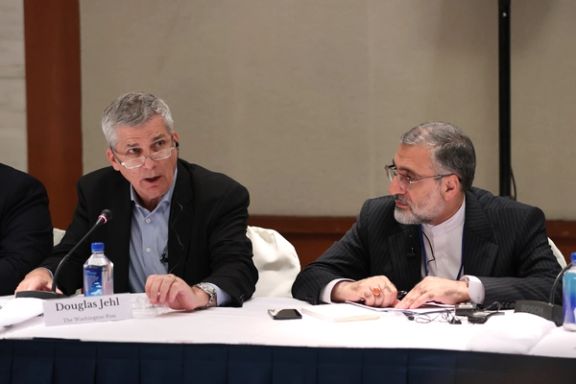
The chief of staff of Iran's president, under sanctions from both the US and EU, is accompanying the hardline President on his second consecutive trip to New York.

The chief of staff of Iran's president, under sanctions from both the US and EU, is accompanying the hardline President on his second consecutive trip to New York.

In spite of having one of the world's worst records for human rights, Iran's president told the UN's secretary general that attention to women's rights are “unparalleled” in the Islamic Republic.
His remarks come in the wake of more than one year of women-led protests in the country, dubbed Woman, Life, Freedom, in which the nation has fought back against the mandatory headscarf and widespread oppression against women and minorities. He spoke just hours after a prisoner swap deal that saw $6 billion released by the United States and five regime-affiliated convicts in the US freed from prisons.
Ebrahim Raisi claimed that the presence of Iranian women and girls in various fields such as science, sports, social, and cultural activities shows the nation's attention to women's rights, in remarks made to UN Secretary General Antonio Guterres ahead of the General Assembly.
"The Islamic Republic is ready to cooperate with the United Nations for the promotion of peace and security in the world and to prevent oppression against nations," he added.
His claims come as an earlier report by the US-based Human Rights Activists News Agency (HRANA) has described the situation of women in Iran as “dire”.
With women having been at the forefront of anti-regime protests, burning headscarves and cutting hair in protest against the oppression of the Islamic Republic, the rights group said, "at least 3,953 women were arrested, of which 1,019 were identified by HRANA, [and] 160 of them were female university students.”
According to HRANA, since September's unrest, at least 2,003 women were reprimanded in different ways, including being summoned to police authorities, due to the improper wearing of the hijab.
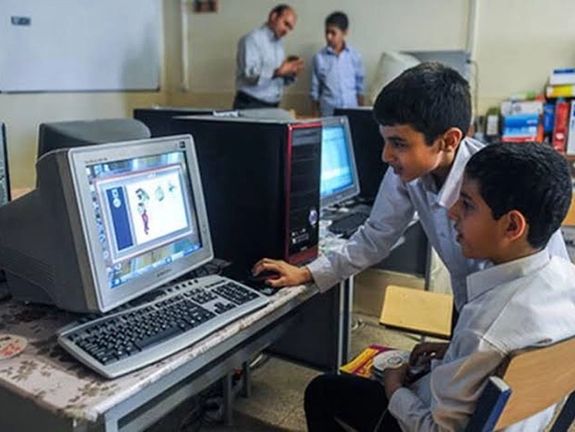
Iran's internet speed hit its lowest point in the past year compared to other countries globally, according to the latest Speedtest report.
Based on the website’s data from August 2023, the average mobile internet download speed has reached 31.33 megabits per second, showing a more than 6% decrease compared to the previous month. The upload speed has also decreased by approximately 4%.
Iran's broadband fixed internet speed has also experienced a decline. The average fixed internet download speed in August recorded at 11.92 megabits per second, indicating a 1.5% decrease compared to the previous month. The upload speed for fixed internet also shows a declining trend.
On the other hand, Iran's position in the list of surveyed countries regarding internet speed has dropped to the lowest rank in comparison to the past year. In August 2022, Iran was ranked 69th among 145 countries in mobile internet speed, but it has now fallen to 72nd place.
A similar situation has been experienced in fixed internet, with Iran dropping five ranks compared to the previous year. Part of the reason for the decline in Iran's internet speed ranking is the growth of internet speed in other countries around the world.
According to the Speedtest statistics, the United Arab Emirates, Qatar, and Kuwait have been recognized as the top countries in terms of mobile internet speed in the world.
For years, Iranian authorities have restricted citizens' access to approximately half of the top websites in the world. In this regard, surveys by the Tehran E-commerce Association indicate that Iran, after China, has the most restricted internet access in the world.
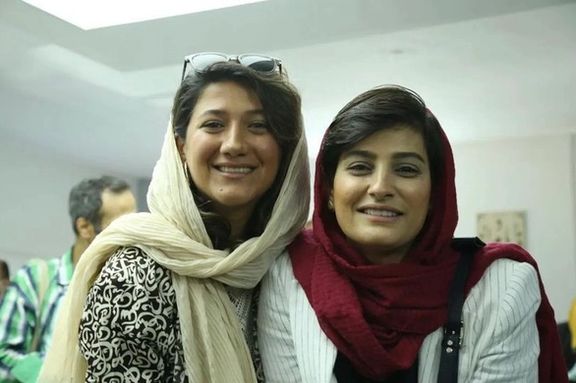
Attorneys for two Iranian journalists kept in jail for nearly a year for first reporting Mahsa Amini’s death in police custody have requested their immediate release.
Niloufar Hamedi’s and Elahe Mohammadi’s lawyers submitted legal requests for their release after one year of “temporary detention”, which even according to Iran’s laws is illegal.
The two journalists – from reformist Iranian dailies Shargh and Ham-Mihan – have been imprisoned for about 350 days because the regime blames them for the nationwide protests that followed Amini’s death in hospital on September 16, 2022, after her arrest by the notorious hijab police.
The Islamic Republic is known to crack down on people who reveal corruption and wrongdoing in Iran, with authorities announcing that reporting the crimes is worse than the crimes themselves.
Hamedi reported about Mahsa Amini struggling for her life in a hospital after receiving fatal head injuries while in custody. When the 22-year-old Amini passed away, residents of Tehran began gathering around the hospital to protest and soon demonstrations spread to many cities. The Women, Life, Liberty movement that began presented the most serious challenge to the Islamic regime in its 44-year history and lasted for months.
Iran’s intelligence ministry and the Revolutionary Guard accused the two reporters of having links with the CIA and foreign governments and conspiring to agitate public opinion against the regime.
Hamedi’s attorney, Partu Borhanpur in an interview with Shargh newspaper said two months have passed since her trial was held and the court has not announced its decision, keeping Hamedi illegally in temporary detention.
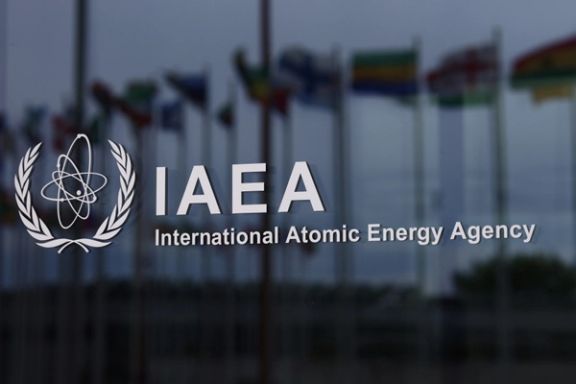
The US and three European allies have condemned Iran’s move to bar IAEA inspectors assigned to the country as another step in the wrong direction.
The United Kingdom, France, Germany -- the so-called E3 -- and the US issued a statement Monday, a few days after the UN nuclear watchdog announced that Iran has withdrawn the designation of several UN inspectors assigned to conduct verification activities in Iran under the Non-Proliferation Treaty Safeguards Agreement.
Having arrived in New York for the UN General Assembly, IAEA director Rafael Grossi told Iran International’s Arash Alaei Monday that he hopes to meet with Iranian officials “to see if they can regress” this unconstructive move. “I was very critical of this move... it was not constructive; it’s not a step in the right direction. it's not good."
He added that the only way that Iran could dispel any doubts about its nuclear program is to allow the IAEA to inspect, noting that “If they allow us to work, then there will be confidence; otherwise, it will be very complicated.”
Via a rare public statement, International Atomic Energy Agency's Rafael Grossi had decried Iran's "disproportionate and unprecedented" move on September 16, saying that it hinders IAEA oversight of Tehran's atomic activities. Tehran was showing displeasure in the face of a threat by the US and the E3 of another resolution to censure Iran for lack of cooperation with the IAEA.
In their Monday statement, the US and its allies said, “Iran’s actions will undermine the Agency’s ability to carry out its safeguards mandate effectively,” which constitutes an unnecessary blow to an “already strained relationship between the IAEA and Iran”.
Expressing concern over Iran expanding its nuclear activities, and its deliberate hampering of IAEA’s verification and monitoring activities – mandated under Iran’s NPT Safeguards Agreement, the US and E3 joined Grossi in strongly condemning "unilateral” measure.
“This is at a time when the IAEA has serious, longstanding, and unresolved questions related to undeclared nuclear materials and activities in Iran that Iran has failed to address for more than four years.”
They urged Tehran to “immediately reverse these inspector de-designations and fully cooperate with the Agency to enable them to provide assurances that Iran’s nuclear program is exclusively peaceful.”
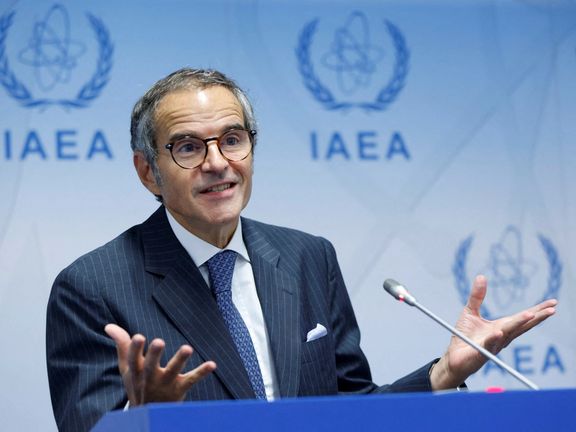
On Sunday, the European Union also urged Iran to reconsider its decision, with the spokesman for EU foreign affairs Peter Stano saying, "The European Union is highly concerned by the ... decision by Iran to withdraw the official designation of several experienced IAEA inspectors to monitor and verify its nuclear program."
"Particularly worrying is the direct and severe impact of this decision on the Agency's ability to conduct its verification activities, which includes the monitoring of the Joint Comprehensive Plan of Action. The EU urges Iran to reconsider its decision without delay," the statement said.
Earlier in the day, US Secretary of State Antony Blinken acknowledged the threat posed by Iran’s nuclear program during a meeting with foreign ministers of the Persian Gulf Cooperation Council member states, who are also in New York for the UN summit.
“We’re cooperating to deter Tehran’s aggression and destabilizing activities, including the threat posed by its nuclear program,” he said, adding, “And we’re working to uphold freedom of navigation, such as through a multinational task force that is protecting ships in the Strait of Hormuz.”
In June, the US Naval Forces Central Command hosted a two-day multilateral maritime security meeting for 90 senior military officers and diplomats from 22 nations, including GCC member-states. The counterterrorism working group and the Iran working group are two of the most active bodies set up under the umbrella of GCC-US partnership.
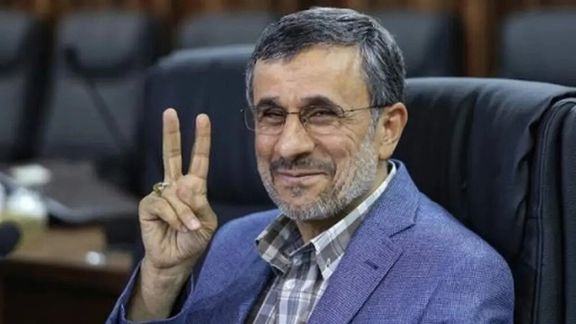
The US has sanctioned former Iranian President Mahmoud Ahmadinejad for the disappearance of a US citizen 16 years ago, while releasing $6 billion to Iran to free other hostages.
On Monday, as five Iranian-Americans held hostage in Iran for several years were allowed to leave, the United States announced designations for Ahmadinejad and Iran’s Intelligence Ministry.
The move to allow $6 billion frozen in South Korean banks due to US sanctions to be released has been criticized by Republicans, experts and many Iranian Americans as a counter-productive decision that will endanger other Americans and embolden would-be hostage takers.
The sanctions announced today are seen as a move by the administration to counter these criticisms, while Ahmadinejad holds no significant power in Iran and has been isolated by the regime. While criticizing the regime since 2017, the former president has maintained silence for more than a year.
A statement released by the State Department said the US is “designating Iran’s Ministry of Intelligence and Security (MOIS) in connection with the MOIS’s involvement in the wrongful detention of U.S citizens and former President Mahmoud Ahmadinejad for his support to MOIS.” It added, “During Ahmadinejad’s term in office, Iran’s MOIS abducted and detained Bob Levinson with authorization by senior Iranian officials.” Levinson traveled to Iran and disappeared in 2007.
The prisoners released on Monday were arrested on trumped-up charges and convicted for espionage and other security crimes in sham trials without due process of law.
Gholam-Hossein Esmaili’s initial blacklisting in 2011 stemmed from his role as the head of Iran's prisons organization, where he faced accusations of "serious human rights violations."
He is under sanctions due to his involvement in the widespread detention of political protesters and his role in concealing abuses within the prison system.
Esmaili served as the spokesperson for the Judiciary of the Islamic Republic from 2019 to 2021 and held the position of Tehran Province's chief justice from April 2014 to August 2019. On August 8, 2021, he was appointed as chief of staff of Iran's president.
President Ebrahim Raisi, who is himself on the US and European sanctions lists, is currently in the US to attend the UN Assembly, a move met with global criticism in light of the country's recent crackdowns.
Prior to assuming the presidency in August 2021, Raisi served as Iran's Judiciary chief. However, his extensive career within the Islamic judiciary has drawn criticism from human rights organizations, accusing him of significant human rights violations.
He was a member of a death committee responsible for ordering the execution of thousands of political prisoners in 1988, which he openly acknowledges.






